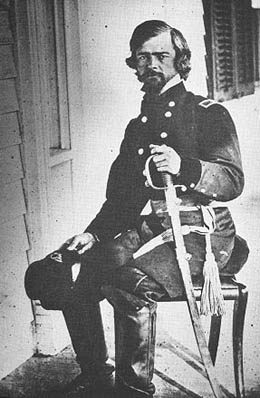On September 28, 1861, Isaac Stevens (1818-1862), Washington Territory's first governor and two-term delegate to the U.S. Congress, is promoted to Brigadier General in the Union Army.
Returning to Fight the War
In May 1861, after news of the outbreak of the Civil War reached Washington Territory, Stevens had offered his services to the Union and traveled east. Based on his West Point education and his military experience in Mexico and the Northwest, he anticipated an immediate appointment as a high-level officer with the U.S. Army. But because of his prominence in the Democratic Party and his well-publicized attempts to secure a peaceful compromise during the secession crisis of 1860 and 1861, he was not immediately welcomed by members of the Lincoln administration upon his arrived in the capital in July.
The Union defeat at the Battle of Bull Run late that month, however, emphasized the need for officers of Stevens's training and expertise, and in early August he was offered a commission as colonel of the 79th Regiment of New York Volunteers, known as the Highlanders in honor of the preponderance of Scotsmen among their ranks. The Highlanders were stationed with the Army of the Potomac near Washington, D.C. Upon assuming his command, Stevens found a regiment that had been decimated at the Battle of Bull Run. During the ensuing weeks, he quelled a near-mutiny, imposed discipline, restored morale, drilled his inexperienced troops, and led successful skirmishes against Confederate forces in the area.
Having demonstrated his leadership abilities with the Highlanders, Stevens was placed in charge of their entire brigade, which was engaged in defending the city of Washington against an expected attack. Although he was now commanding a brigade, Stevens had not received a promotion in rank. He suspected that a long-standing personality conflict with General George McClellan (1826-1885), commander of the Army of the Potomac, might explain the delay. When lobbying by influential friends produced no results, he decided to send his 19-year-old son Hazard (1842-1918), who served as his aide, into the capital to deliver a message to President Lincoln (1809-1865).
Lincoln Promotes Stevens
According to Hazard Stevens, the president received him "in a kindly and fatherly manner that at once placed him at ease," and explained that General McClellan had advised against the promotion, insisting that "Colonel Stevens had better remain in command of the Highlanders some time longer ... that it would not be safe to take away their colonel at present" (Stevens, 334). Lincoln promised to attend to the matter, and subsequently wrote to McClellan "May I not now appoint Stevens a Brig. Genl? I wish to do it" (Lincoln, 4:504).
On September 28, Stevens received his promotion to brigadier general. He requested that his commission specify his residence as Washington Territory, insisting that "if life is spared me, I shall be in the Territory again" (Richards, 364).
Isaac Stevens was killed in action in 1862 during the Battle of Chantilly.

